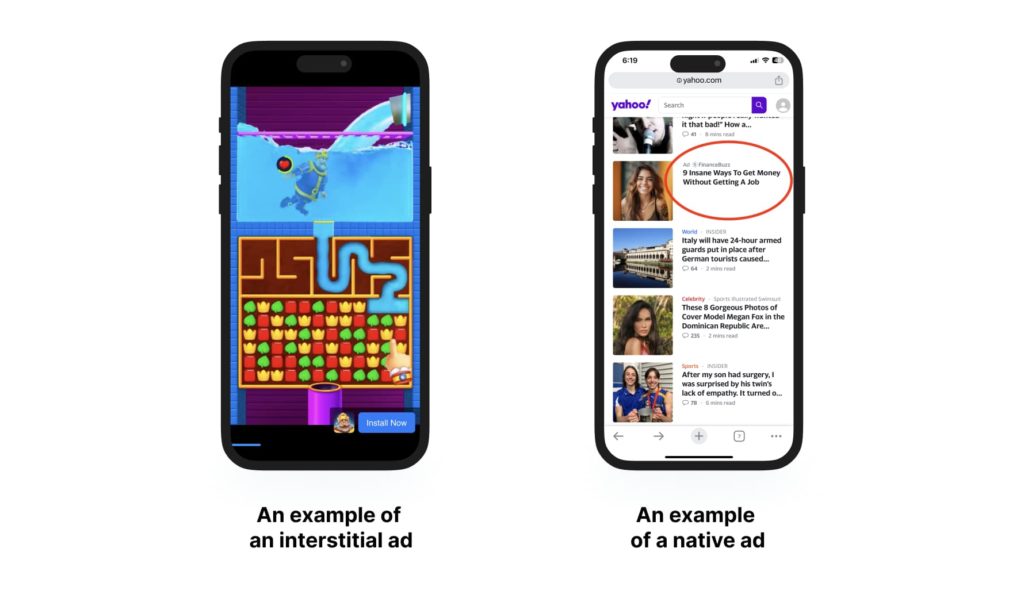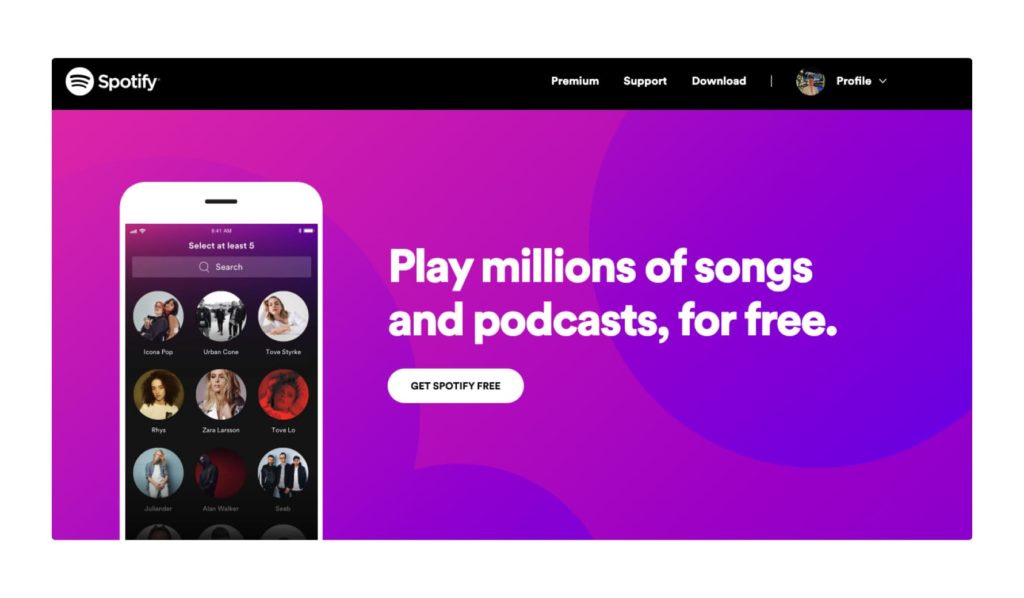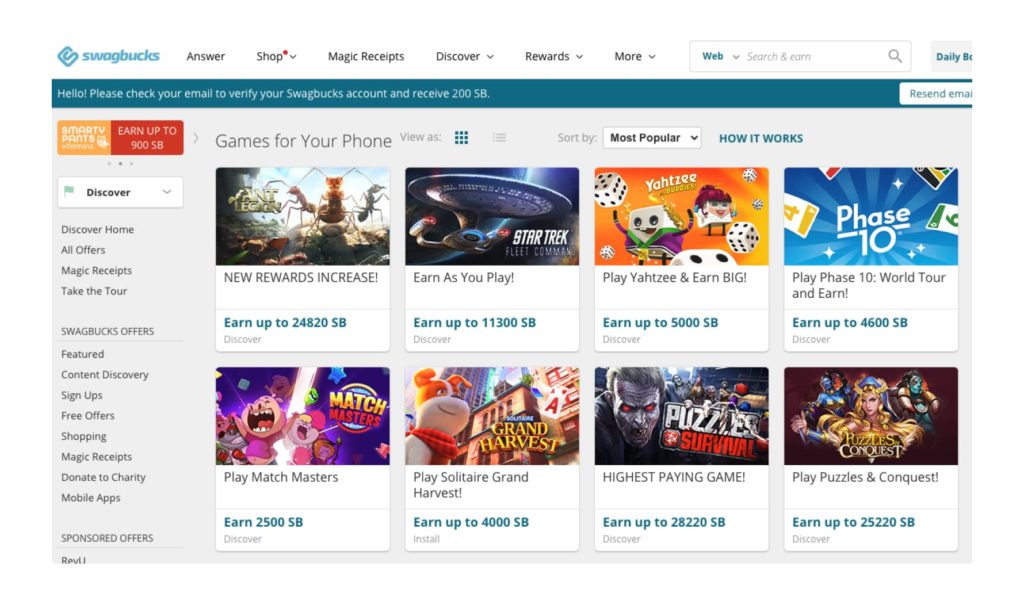The Quick In-App Monetization Guide: Skyrocket Your Growth Now!
 Anastasiya Starovoytova
Anastasiya Starovoytova  Anastasiya Starovoytova
Anastasiya Starovoytova This is a guest post by Lukasz Lebensztejn, an entrepreneur whose journey through personal development and business led him to excel in the world of mobile advertising. With his dedicated blog, he guides aspiring marketers through the dynamic landscape of digital advertising, providing essential insights for success in their businesses.
The world of app monetization, with its myriad strategies and models, can seem overwhelming at first.
App monetization can sometimes feel like climbing a steep hill without the right gear. Where do you even start?
After investing tremendous effort into creating a great app, the challenge of monetizing it can seem confusing. Even making money through your phone can be difficult but not impossible.
Many app developers struggle to monetize their creations or simply take shortcuts that can eventually hurt their brand image.
We’re here to break down those barriers for you!
No more feeling lost in jargon or tangled up in complex revenue streams — we’ll simplify things so that you can focus on what matters most: building great apps and making them profitable!
Mobile app monetization is the bread and butter for countless free apps populating the digital landscape. With an astounding 1.7 million apps on Apple’s iOS App Store, coupled with nearly 2.6 million contenders on Google Play Store, it’s relatable to finding a needle in a haystack.
This cutthroat competition necessitates not just survival but also profitability through effective app monetization strategies that ensure your mobile app doesn’t get lost amidst millions of others.
But what does mobile app monetization entail?
It’s all about generating revenue from various avenues such as displaying ads within your application or offering premium features via in-app purchases. This way, you can cover costs related to development, user acquisition campaigns, and other operational expenses linked with running an app business successfully.
Selecting the right mobile app monetization model isn’t merely flipping coins though; careful consideration must be given to factors like target audience behavior patterns, how fierce the competition is, and what functionalities your product offers compared to similar ones out there.
Your choice will directly impact both users’ experience while using your product and its potential revenue generation capabilities, so choose carefully!
Discover our effective app monetization strategies and models to boost your mobile app revenue. Uncover best practices for success in our comprehensive guide below!
For those seeking to monetize their apps, in-app advertising is an essential strategy that could potentially generate up to $226 billion by 2025. This approach involves showcasing ads within the confines of your app where money flows based on user actions like clicks or views.
You’ve got options when it comes to ad types too.
Interstitials are full-screen pop-ups showcased at specific intervals while native ads subtly blend into the interface, improving user experience along the way.

Premium subscriptions require users to shell out cash upfront for access whereas freemium models offer basic features free-of-cost but charge for advanced perks. Just take a look at Spotify’s journey; they show just how effective these methods can be if done right.

Affiliate marketing brings flexibility onto the table as far as earning potential goes, since it allows you to earn commissions by promoting other businesses’ products or services within your app’s framework.
It’s an excellent route toward diversifying income streams without banking solely on traditional ad placements.
Here are some affiliates promoting their games through Swagbucks:

In the world of mobile app monetization, communication is highly important. A successful approach can have a major effect on consumer participation and revenue generation. Two methods that have been shown to be particularly effective are SMS marketing and email marketing.
With its direct reach, SMS marketing has emerged as a powerful tool in an app’s arsenal. It allows you to send personalized messages about new features or enticing offers directly to your users’ phones, reminding them why they downloaded your app in the first place.
The catch? Your messaging needs to add value rather than feel intrusive; otherwise, it might just lead to uninstalls instead of increased user engagement.
Here is a great SMS campaign from Pacific Coast:
Emails serve as another potent weapon when it comes down to retaining users and boosting their interaction levels within your mobile apps. They provide ample space for detailed information regarding updates or premium offerings available on your platform.
This demonstrates how tailored emails can play a pivotal role while communicating with different segments within your user base.
In essence, these strategies form integral parts of any successful mobile app monetization model where maintaining customer relationships goes hand-in-hand with subtly promoting various opportunities like paid upgrades or affiliate promotions.
Check out this perfectly executed email campaign by POP! Slots. These emails always drive me back to the app!

When it comes to app monetization strategies, crowdfunding stands out as something a bit different. It’s more than just a revenue stream; it builds an engaged community around your mobile app instead of actively looking for new users through traditional advertising.
Take Fluent Forever as an example. This language learning application used the power of its compelling story and enthusiastic audience, on Kickstarter, to raise over $500k in funds for development. Imagine the potential for your app!
Kickstarting a successful crowdfunding campaign isn’t simply about asking for money. You’re selling an idea that needs to resonate with potential backers who are willing not only to invest financially but also emotionally into your project.
You’ll need realistic funding goals along with attractive rewards at various contribution levels which act as incentives driving financial support from those invested in seeing you succeed.
Apart from generating much-needed capital, there are several other benefits tied up within this unique approach toward mobile app monetization models. One major advantage is market validation before full-scale development begins. If people are ready to fund your concept, the demand exists.
In addition, early adopters often turn into advocates spreading word-of-mouth referrals – an invaluable form of advertising!
So while looking ahead at emerging technologies or changing consumer behaviors may seem daunting, remember these trends can be leveraged when considering innovative approaches like crowdfunding.
Selecting a suitable app monetization strategy is no walk in the park. We made it much easier for you to consider the key factors that will determine which monetization model works best for your mobile app.
Knowing your target audience is essential when selecting an appropriate monetization model. If millennials make up most of your user base, freemium models might be their cup of tea since they usually prefer free apps with optional premium features.
If business professionals form the majority of users, don’t hesitate to go for paid or subscription-based models as these folks value quality over cost any day.
The competitive landscape can heavily influence which mobile app monetization model suits you best. You wouldn’t want potential users running off because similar apps offer ad-free usage while yours doesn’t, right?
It’s all about prioritizing user experience above anything else. Understand your users and match them with a congruent model.
Here are some best practices that have been successful in the monetization of mobile apps in 2023.
Your first order of business? Getting users to download your app.
Once users have been enticed to download the app, it is important to implement strategies such as social media promotions in order to both retain them and draw new customers.
This involves creating engaging content about your app on various platforms, optimizing keywords related to your app’s functionality and benefits, and maintaining an active presence where potential customers hang out online.
Relying solely on one monetization method might leave money on the table. That’s why implementing hybrid models using multiple methods such as in-app purchases combined with in-app advertising is a smart move.
Think about how Spotify offers both free ad-supported access (in-app ads) and premium subscription plans — this dual approach caters to different user preferences while maximizing revenue opportunities.
As cliche as it is, data is king when it comes to refining your revenue generation strategies. Leveraging analytics data gives invaluable insights into user behavior patterns which can guide strategic decisions around scheduling ads or introducing new features based on peak engagement times.
The future of mobile app monetization is always transforming, with the emergence of fresh technologies, modifications in consumer conduct, and regulations always changing. From emerging technologies to shifting consumer behaviors, it’s a landscape that never stops evolving.
Let’s look at how upcoming trends may affect your app’s monetization strategy.
We’re seeing an upswing in blockchain technology leading to decentralized apps (dApps). This opens up fresh avenues for revenue generation through token sales, providing developers with innovative ways to cash in on their creativity.
To stay ahead of this curve, consider exploring blockchain governance models, which can offer insights into how these systems work within dApp structures.
Your users are becoming more privacy-conscious than ever before; they value their data security highly. So much so, many don’t mind shelling out extra bucks for premium features ensuring better protection against data breaches or misuse.
This shift towards prioritizing privacy might lead us towards freemium models where users pay for enhanced features or even full-fledged paid subscriptions.
Regulatory changes, such as the requirement for user permission prior to tracking them across other companies’ apps and websites, have set a precedent. This could impact ad revenues but also offers opportunities like contextual advertising or subscription-based models not reliant heavily on personal data collection.
In conclusion: keep learning. Stay informed about these trends as they develop over time because staying profitable means being adaptable amidst changing circumstances.
You can monetize your app through in-app advertising, freemium or premium subscriptions, in-app purchases, affiliate marketing, SMS and email marketing, sponsorship ads, licensing, or crowdfunding.
App monetization is the process of generating revenue from a mobile application. It involves implementing strategies to convert users into paying customers or generate income via advertisements.
You can use methods like freemium models offering paid features within a free application, premium models where users pay upfront, in-app purchases for extra content, subscription services for regular updates, or even crowdfunding campaigns.
App monetization is a vital lifeline in today’s digital landscape.
With the right monetization model, you can leverage your app to create a steady income stream.
In-app advertising can be transformative, while freemium and premium subscriptions each have their unique advantages.
Affiliate marketing offers flexibility, and communication strategies like SMS and email marketing can bolster user engagement.
Crowdfunding presents an innovative way to fundraise while building a community around your app. Even trying Apple Search Ads to drive more user acquisition can be fruitful.
The choice of the right model depends on factors such as target audience, competition, and functionality of the app — with user experience always taking center stage.
To stay ahead in this game, remember to invest in user acquisition strategies, implement hybrid models, use analytics data for optimization, and keep up to date on future trends impacting your mobile app.